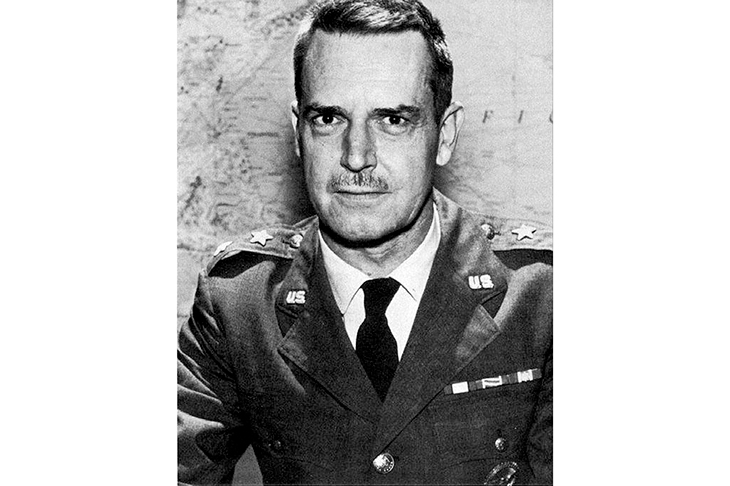With its grim John le Carré atmosphere, communist Eastern Europe in the late 1980s was a melancholy, out-at-elbow place. The Estonian capital of Tallinn crawled with Russian money-changers (‘Comrade, we do deal?’). The television in my hotel room was detuned from capitalist Finnish to Soviet channels, but I was able to pick up Miami Vice from across the Gulf of Finland. Guests were not allowed to visit the 21st floor, which officially did not exist. The KGB apparently had an office up there where they monitored Helsinki radio waves and the hotel’s 60-odd bugged rooms. Perhaps it is no coincidence that the wallet-thin Minox camera had been invented in Tallinn (by one Walter Zapp, in 1936). It was a favourite with Cold War spooks.
George Orwell had coined the term ‘cold war’ in 1945 to denote antagonisms between the capitalist West and the godless monolith that was Stalin’s Soviet Union. At its peak in the early 1960s the war involved botched assassination attempts and ill-fated East-West infiltration missions from Tehran to Guatemala City. In Scott Anderson’s analysis, the Cold War froze people’s ability to think, killed off interesting thoughts, interesting people and interesting ideas. In the end, he reckons, the United States was seen as just ‘one more empire that lied and stole and invaded’.
Even decent Americans could commit grotesque acts of political violence in the name of ‘free world’ values
Fidel Castro’s own brand of Cold War balcony-ranting served merely to draw a line in the sand through the West Indies and beyond, which one crossed at mortal risk. Us or Them? Even Americans of moderation and decency were tempted to commit grotesque acts of political violence in the name of ‘free world’ values. Happily, such foolishness is over for the moment, but what a story it makes.
Anderson, a social historian and former US war correspondent, tells the story through the lives of four key CIA operatives. His book (titled after Graham Greene’s great 1955 novel The Quiet American) casts a disillusioned eye over the spycraft antics of Michael Burke, Edward Lansdale, Peter Sichel and Frank Wisner. All-American stalwarts, these CIA men trained anti-communist Albanian commandos to topple Comrade Enver Hoxha’s Stalinist regime in Tirana. They air-dropped insurrectionists into Khrushchev-era Estonia and argued points of strategy with their paymasters in Washington. The ‘crapshoot nature’ of their covert operations was such that cyanide ampules were pressed on volunteer combatants in case of capture. Any one of Anderson’s four CIA men could have strayed off a movie set.
Michael Burke, a 007 figure ‘before James Bond existed’ (not to be confused therefore with the BBC journalist Michael Burke), worked as a screenwriter for Ava Gardner and other Hollywood stars until the CIA recruited him over lunch one day at the Algonquin. With his saturnine good looks, the former football halfback cut a dashing figure amid the smoke-and- mirrors game of espionage. In 1955, however, Burke quit the CIA in frustration to become the manager-ringmaster of a travelling circus. (‘You’ve been training for it all your life,’ his new boss told him, adding: ‘You just haven’t known it’.)
Sichel was another who came to view his operations as essentially useless at best. A German Jewish émigré, he oversaw CIA activities in Eastern Europe and routinely ran agents across the Berlin border after the Wall went up in 1961. Entrapments, infiltrations, fatally miscalculated alliances and political defections — all for what? Disillusioned, Sichel re-invented himself as America’s most persuasive salesman of bad table wine. (‘Ex-Spy is Man Behind Blue Nun,’ explained a 1980 newspaper headline.)
The last days of the Cold War were shadowed by the reforming spirit of Mikhail Gorbachev. Encouraged by the Russian president, Tallinn instituted a number of profit-making businesses ranging from a private public lavatory where you could relieve yourself for 20 kopeks to a pie-shop that sold Crimean meat pasties. The singular world of the Cold War meant that one half of Europe was dining out expensively while the other half was standing in queues for a Soviet equivalent of the Cornish pasty. Alas, Gorbachev realised too late that the moment of greatest danger for an absolutist regime is when it begins to reform itself.
In November 1991 his replacement, the anti-Soviet president Boris Yeltsin, terminated the USSR’s existence when (reportedly inflamed by vodka) he banned the Communist party within Russia. Considering the magnitude of what happened, surprisingly few people died in the twilight moments of the Cold War. The Berlin Wall was broken up and sold off in chunks (preferably graffiti-daubed chunks) to tourists as a keepsake of totalitarian oppression and Cold War division. Lives had been ruined. Frank Wisner, Anderson’s pre-eminent CIA spymaster, committed suicide in 1965 after a diagnosis of ‘psychotic mania’. The Quiet Americans, superbly researched, is the beginning of wisdom in these frightful matters.






Comments